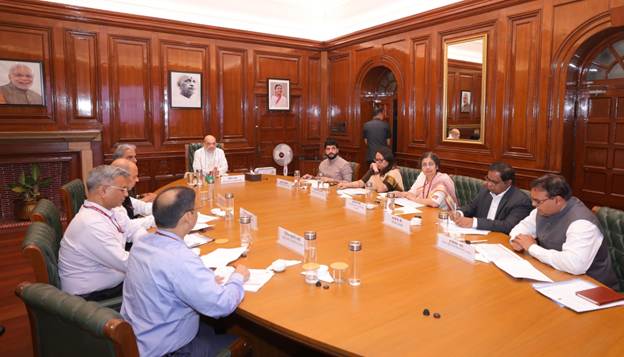Union Home Minister and Minister of Cooperation Amit Shah chaired a significant meeting in New Delhi on Tuesday to review and strategize the future of sustainability and circularity in the cooperative dairy sector on Tuesday. The meeting brought together key stakeholders including Union Minister of State for Cooperation Krishan Pal Gurjar, Murlidhar Mohol, Secretary of the Ministry of Cooperation Ashish Bhutani, Secretary of the Department of Animal Husbandry and Dairying Alka Upadhyaya, NDDB Chairman Dr. Meenesh Shah, and NABARD Chairman Shaji KV.
Aligned with Prime Minister Narendra Modi’s vision of “Sahkar Se Samriddhi” (Prosperity through Cooperation), the meeting led to the decision to establish three new multi-state cooperative societies aimed at bolstering the dairy sector. These include:
- A society focused on animal feed production, disease control, and artificial insemination.
- A society promoting cow dung management models.
- A society encourages the circular use of dead cattle remains.
Addressing the gathering, Amit Shah emphasized the need to move towards White Revolution 2.0, highlighting the importance of building a sustainable, circular economy-based dairy ecosystem. He underlined that increasing farmers’ incomes hinges on creating a network of integrated, mutually cooperative societies that offer end-to-end support to dairy farmers.
Shah also stressed the importance of ensuring carbon credit benefits reach farmers through scientifically designed models and called for greater emphasis on strengthening milk unions, food processing in dairy plants, and enhancing cooperative efficiency.
“Cooperation is the backbone of rural development,” Shah said, adding that dairy cooperatives have proven to be a reliable source of livelihood for millions of rural families, particularly by providing access to stable markets, credit, veterinary services, and breeding support. He also highlighted the crucial role these cooperatives play in empowering women through active participation in dairy activities.
The Minister said that the transformation from “Sustainability to Circularity” must be multi-dimensional, with farmers’ cooperatives stepping up to provide services like technical assistance, feed supply, veterinary care, dung management, and milk processing, traditionally dominated by the private sector.
Referring to successful models such as Amul, Shah stated that the “Cooperation among Cooperatives” initiative is playing a pivotal role in realizing the government’s vision. He noted that village-level cooperatives are being strengthened and integrated with allied sectors through collaborative efforts between the Ministry of Cooperation and other ministries.
Shah praised national institutions like the National Cooperative Development Corporation (NCDC), National Dairy Development Board (NDDB), and NABARD for their ongoing contributions to the cooperative movement. He highlighted NDDB’s biogas and dung management programs as exemplary models of sustainable innovation that should be scaled up nationwide.














